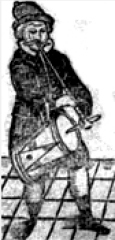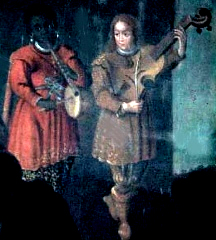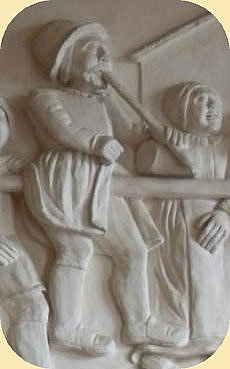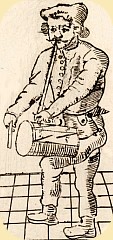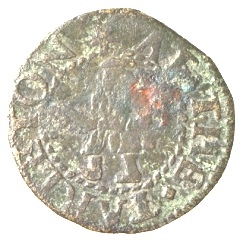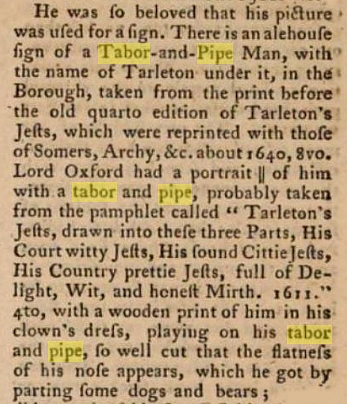England: history of the pipe and tabor
the 17th century players
| In the 17th century neither terminology nor spelling were fixed.
So a pipe and tabor player could be, for example, a minstrel, a musician, a drummer, a pyper, taber and pipe or a fidler. It is impossible to know now which of some of the quotes below are taborers or players of other instruments as seen in contemporary images. |
||||
|
||||
| before 1606 - Robert Smyth, a preacher and lecturer, was an extreme Puritan.
"...His refusal to wear a surplice, though ordered to do so by the bishop, brought the dispute to a head. 1907 'The Parish Clerk' by Peter Hampson Ditchfield (1854–1930) |
||||
| 1601 Carlton cum Willingham, Cambridgeshire; Diocesan Court Proceedings:
“…did bringe Iohn Lawrence upon a cowlestaffe into the Charchyard, & set him Downe at the Chauncells |
||||
1604 Letter from The Earl of Shrewsbury to Viscount Cranborne. Calendar of the Cecil Papers in Hatfield House: Volume 16, 1604. |
||||
| Itinerant performers in the North Riding ranged from individual pipers, fiddlers, jugglers, and others living close to or below the poverty line, to organized companies of travelling players. Most of these did not play under gentry patronage and so were vulnerable to arrest and punishment under the Elizabethan and Stuart poor laws governing 'rogues, vagabonds, and sturdy beggars' When these people were apprehended, the court normally recorded not only the names but also prosecuted those who provided lodging and performance space for them. |
||||
| 1606 Thornton Watlass, Yorkshire North Riding;
Quarter Sessions Records:
“…George Lewling of Watlass kept a piper, and harboured him in his dwelling house for two weeks, and also |
||||
| 1607 Leicester villages rioted over enclosures of common land. In Ladbroke the riot procession was led by a captain on horseback and a man playing a pipe and a tabor. |
||||
1608 Tydd St Giles, Cambridgeshire: 1609 "Edward Towe, a fiddler or minstrell. A presentment is made at Tydd St Giles …the said Towe is cited. Diocesan Court Proceedings |
||||
| 1610 note of an affray involving `revellers led by pipe and tabor' at Walsall Beier, A. L. 'Masterless Men: The Vagrancy Problem in England 1560 -1640.' 1985 |
||||
| 1610-11Scorton Yorkshire North Riding; Quarter Sessions Records: “The Iury also present Iohn Lockey alias Lockwood of Scorton for the aiding, &c, harboring and mainteyning of certain people to the inhabitantes unknowne, being people of badd behavior, mightily suspected for many bad misdemeanours, himself verie lewdly given, frequenting bad companie in markettes, faires and other frequented places where resortes of people is, being in the nature of a drummer;…” |
||||
1611 Sir Richard Paulet's Household Accounts at Stanbridge and King's Somborne, Hampshire : "to speede for playing on ye taber xij d" |
||||
1612 Peter Hales (1565-1643), known as 'Blind Pete', played the pipe and tabor for the Stafford hobby-horse 'Peter Hales, taberer' was fined 20s for keeping an unlicensed tippling house in the town in 1614. Stafford had a hobby-horse as far back as 1528. It used to dance at winter festivals and ales, and was a festive way pamphlet written by D.A.Johnson of Stafford Historical and Civic Society, 1974-76 titled 'The Stafford Hobby-Horse' |
||||
1613 “…at Kelvedon, Easterford, Colchester, John Ayly, an alehouse-keeper, was presented in the archdeacon's court J. A. Sharpe in `Crime and delinquency in an Essex parish 1600-1640' (in Crime in England 1550-1800, ed J.S .Cockburn (1977), 90-109 |
||||
| 1613 Winchester College Bursars' Accounts: "(Necessary expenses with gifts) |
||||
| 1613 Brandsby Hall, Yorkshire North Riding:
payment for Christmas entertainment
“The pyper of Myton for Christmas tyme pypynge I payd him v s. ...” Richard Cholmeley's Memorandum Book |
||||
| 1614
“Willelmus Harden maynteyneth dysorder as dauncinge pypinge swearinge & swaggeringe"
Archdeaconry of Stafford Visitation Act Book. |
||||
| 1613 The voyage of Captain John Saris to Japan: Journal of John Saris, Captain of the Eighth Voyage
of the Company: In January 1613 |
||||
1614 a number of pipers were prosecuted at Hutton Buscel, Yorkshire North Riding, Quarter Sessions |
||||
1614 Kirby Misperton, Yorkshire North Riding, Quarter Sessions: "The Jury for our sovereigne Lord the king upon their oathes present Richard Darrell of Kirkby misperton |
||||
| 1615 Freefolk, Hampshire;
Sir Thomas Jervoise's Household Accounts: “Item for pipinge 0–0–1” |
||||
1615 In November William Harrison, his wife Isabella, and John Gowling were presented before archdeacon Theatre, Catholic Communities, and Popular Entertainment in England’s North-East, c.1600-1625 by Gašper Jakovac |
||||
| 1616 Burton upon Trent, Staffordshire: “…The said Jane ... went from her brothers house in Ansley with one Archdeaconry of Stafford Visitation Act Book |
||||
1618 Tutbury, Staffordshire; Regulations Governing the Minstrels' Court A set of rules was drawn up to regulate and impose standards on minstrels and musicians in Derbyshire and Staffordshire. |
||||
16th Oct 1619 Richard George of Westminster, taborer, was fined £20 and told to keep the peace WESTMINSTER SESSIONS OF THE PEACE: COURT IN SESSION |
||||
| 1620's In Worcestershire generally there were increasing prosecutions for Sabbath-breaking in the early l600's, continuing unabated in the 1620s. Some Bishopston people found themselves in trouble for playing the tabor and pipes during evening prayer time. |
||||
1620 In Benton, just outside of Newcastle, Christopher Dawson entertained: Theatre, Catholic Communities, and Popular Entertainment in England’s North-East, c.1600-1625 by Gašper Jakovac |
||||
| 1620-21Winchester, Hampshire; Winchester College Bursars' Accounts:
(Necessary expenses with gifts) |
||||
| 1620, Chester; an inventory of property of the late Robert Hesketh included: "vyolls, vyolentes, virginalls, sagbutts, howboies, and cornets, cithrun, flute and taborpypes.” [viols, violins, virginals, sackbuts, hautbois, and cornetts, cittern, flute and tabor pipes.] |
||||
| 1622 Hovingham, Yorkshire North Riding; Quarter Sessions Records
“…Raph Theaker the piper shalbe sett in the stockes att this present Session att Thirske and likewise |
||||
| 1622-23 Nunwell House, Hampshire; Sir John Oglander's Notes and Accounts:
“for salte and the minstrell 0 2 6” |
||||
| 1626 Winchester, Hampshire; Winchester College Bursars' Accounts:
“Paid to pipers on sundry occasions 5s 10d” |
||||
1630-31 Winchester, Hampshire; Winchester College Bursars' Accounts: “Paid to pipers as a favour 10s” |
||||
1631 Checkley, Staffordshire; “for keepinge a piper playinge in his house on whitsundaie last in prayer tyme in ye afternoone, Archdeaconry of Stafford Visitation Act Book |
||||
1631 Leek, Staffordshire; “Joan Swyndon - for entertayning of divers persons into her house who have prophaned the Sabboth Archdeaconry of Stafford Visitation Act Book |
||||
| 1631 Rushton, Staffordshire; (Against) Richard Slack and Francis Miller Archdeaconry of Stafford Visitation Act Book |
||||
1631 Farlington, Yorkshire North Riding; “ Cicilie Thompson of ffarlington Widdow being an Alehouskeeper for keeping disorders in her house, Quarter Sessions Records |
||||
1633 Warwick Priory flour mill dispute: “In 1633 a dispute arose concerning the [grain] loaders from the Castle, Guy's Cliffe, Emscote, and Priory mills, |
||||
| 1633-34 Aldermaston, Berkshire:
"Thomas Hellyar of Aldermaston in the County of Berkshire [was a] Gardiner and Minstrell " |
||||
1634 Scarborough, Yorkshire North Riding; “The examinacion of william Percey of Slingsby in the Counte of york piper taken before Gregory ffishe Scarborough Borough Court Papers |
||||
Mersennus, a French polymath, mathematician and writer on music (middle of 17th century) mentions |
||||
|
||||
|
||||
1633 criticism written by William Prynne, 1600-1669. [Ed - 'pipes,' 'pipers' 'fidlers' and 'tabers' may include pipe and tabor players here] Page 194 Page 249 Page 278 Page 281 Page 318 Page 319 Page 394 Page 415 Page 419 Page 634 quotes from 'Histriomastix The players scourge, or, actors tragædie, divided into two parts. Wherein it is largely evidenced, |
||||
1650 Parish of Gateshead Parish Register The History and Antiquities of the County Palatine of Durham: Volume 2, Chester Ward. |
||||
1654 "
Information against John Morgan." 'State Papers, 1655: March (3 of 8)', in 'A Collection of the State Papers of John Thurloe, Volume 3, December 1654 - August 1655' |
||||
| 1657 An Act against Vagrants and wandring, idle dissolute persons.
"Any persons commonly called Fidlers or Minstrels who from: "Shakespeare in music; a collation of the chief musical allusions in the plays of Shakespeare, |
||||
| 1665 " When King Charles II. was at Salisbury, a piper of Stratford sub Castro playd on his tabor and pipe before him, who was a piper in Queen Elizabeth's time, and aged then more than 100." In ‘notes’ made by Britten, James, 1846-1924 in a reprint of ‘Remaines of Gentilisme and Judaisme, 1686-87’ |
||||
1678 "Some Observations upon the late Trials of Sir George Wakeman, CORKER; and Marshal, &c. “…I got a stroke upon the pipe and tabor, by which means I now live very comfortably;…” ‘A complete collection of state trials and proceedings for high treason and other crimes and misdemeanors from the earliest period to the year 1783 : with notes and other illustrations’ VOL. VII 1678—1680. pub1816 |
top of page
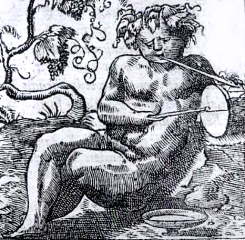
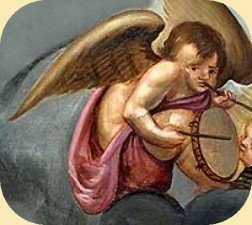 1619 ceiling painting
1619 ceiling painting


